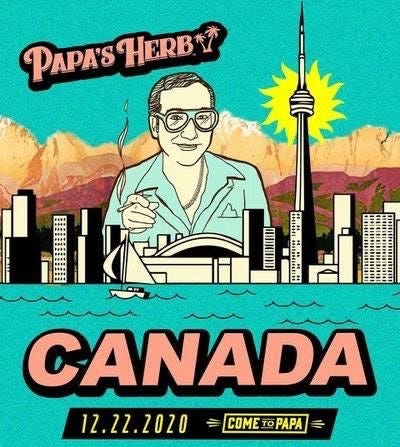How NOT To Build A Cannabis Brand ⚠️
A perfect example of what not to do when it comes to building a cannabis brand
Building a brand in the cannabis industry is no easy undertaking.
For most, it’s an uphill climb. That’s why very few cannabis brands have truly succeeded in this arena so far.
Limited access to social media is one of the main factors as without access to targeted advertising on platforms such as Facebook and Google, cannabis companies find it difficult to build brand awareness.
Yet in spite of these and other constraints placed on cannabis companies, there’s a growing roster of promising startups overcoming these constraints.
As in any industry, having a stand-out brand is more often than not a competitive advantage. Still, it’s important to stand out for the right reasons.
The brand I’ll be highlighting in this edition of Four PM is one that I personally think stands out for all the wrong ones.
Some context to set the stage 🎷
Building a cannabis brand in Canada is notoriously difficult, as the regulations were designed for public safety rather than to help cannabis brands succeed.
With this in mind, a strategy that I’ve seen over and over consists of Canadian cannabis producers licensing an “established brand” from the U.S, which allows them to sell their own product lines under this brand in Canada.
In theory, this strategy has a lot of potential. Everybody wins: the U.S. brand gains access to a new region without having to invest capital in constructing production facilities, and the Canadians don’t have to spend time and capital building a brand from the ground up.
In practice, I can’t say this strategy has been ultra-successful. The story of Papa’s Herb is a great example.
The King Of Miami 👑
Papa’s Herb popped up on my radar around five days ago, when the brand expanded into Canada with the tagline “Come to Papa.”
Curious, I decided to look further into the brand to better understand who was behind it and how they were positioning themselves in the Canadian market.
The brand’s story goes as follows…
“It’s 1985.
Papa was the king of Miami… strolling around town wearing his white suit, mesh loafers, and dark shades, chatting up all the ladies. Papa knew everybody and everybody knew Papa.
He was the kind of guy you couldn’t help but like – a big personality with a big heart. Papa always remembered your name. And when you needed weed, he’d hook you up. He always had a stash of the good stuff. Papa just loved to share the happiness. So here’s to Papa. He’s always sharing the good times.”
So, in a nutshell, the basis for this brand is an old man who apparently lived in the 1980s and liked to dress like he was in the mob while chatting up women and hooking you up with high-quality cannabis. Did I miss anything?
I mean, is this really the best a company can do? Is this really a brand worth paying to license?
For me, it's a solid no on each count.
What happened to understanding your target audience?
As much as I appreciate that no brand will ever appeal to every consumer, it remains incredibly important to appeal to a certain group of consumers.
Who exactly is the target audience for this brand?
I'm unsure, and the value of importing this IP into Canada to help someone sell more units of cannabis will likely be declared the 7th wonder of the world.
Based on the positioning of the brand, it seems that Papa’s Herb is badly designed to appeal to young men who are new to cannabis and are looking for some high-quality cannabis at low price points.
At $24 CAD ($19 USD) for 3.5/grams, their prices certainly seem to be in line with this positioning; but how exactly this brand’s story is designed to appeal to Canadian consumers I will never know.
Now to give credit where credit is due, the brand has over 16K followers on Instagram. Still, my understanding is that the personification of the brand is not actually permitted here in Canada, since you cannot have a person associated with a brand.
A prime example of this is the case that unfolded in 2020 when the Trailer Park Boys were used by Organigram to create “Trailer Park Buds”—a decision that quickly backfired when Health Canada made it crystal clear that such marketing isn’t permitted here in Canada.
With Papa’s Herb, I give it less than four months before we see a press release outlining the company’s plan for making the brand-compliant with Canadian regulations.
The effort required to resolve these issues, however, will likely end up exceeding what anyone could stand to gain from the partnership.
(Shoutout to Cody Hicks for providing some valuable insights on this brand.)
Want Free Money? 💰
Sign up for Four PM and if you haven’t learned anything after 30 days we’ll send you $4




